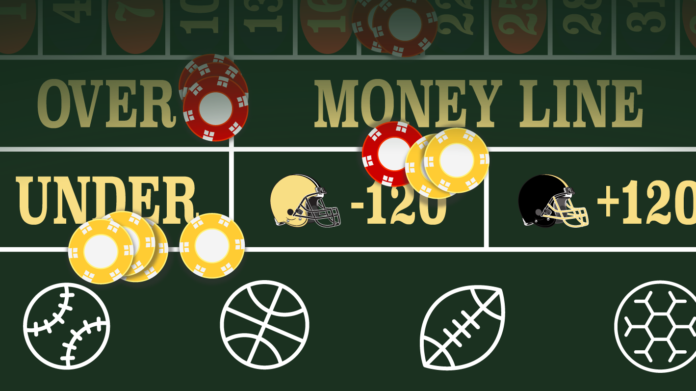Are you new to the world of sports betting and are looking to get familiar? Or are you curious as to what some betting terms imply? If yes, this guide is for you as we will be looking into three main betting types. Whether you are interested in NFL, NBA, or NCAA sports, there are several options available for you to wager on including these three:
- Moneylines
- Point spreads
- Totals or Over/Under
Whether you’re a novice or an experienced bettor, understanding these common betting types is essential for navigating the exciting world of sports betting. Additionally, it’s important to choose the best betting sites that offer competitive odds and a user-friendly interface for a seamless betting experience. Below, we have examined these common betting types in detail to help you get started.
1. Moneylines

Moneylines are the simplest of all betting types. This is because here, you are making wagers on who wins the match. Thus, it is more concerned with the outright winner rather than point spreads or a margin of victory. Therefore, if the team you wager on wins, you win but if they lose, you also lose. There is no middle ground.
Now, in moneyline bets, it is common to see positive and negative signs before the number of odds. These signs are very important in that the plus sign shows who has a lesser chance of winning while the minus sign depicts the team that will likely win.
Additionally, the number after the sign indicates the payout amount if the bet is successful. So for instance, moneyline odds of +120 will yield a payout of $120 if successful, and so on.
2. Point Spreads
The point spread is a betting type that makes a way for bookies to even out the number of wagers they accept on each team. While point spreads are quite similar to moneylines, they differ in that point spreads allow you to predict the winner of the game as well as with what margin the player wins.
And point spreads usually come into play in a game when it is obvious that one team has superior potential at defeating the other. Thus, in a situation like this, wagering on moneylines may not seem ideal so the bookies set odds for a margin of victory. And these margin-of-victory types of bets usually have more value than wagering on outright winners.
To understand it better, let’s use a simple analogy where Team X has odds of +9.5 and Team Y has odds of -9.5. Here, Team Y with negative odds is more likely to win and the number implies the number of points they win over Team X. Thus, if you wager in favor of Team Y, then they must win by at least 10 points for your bet to win. On the other hand, if you wager on Team X, then they must either win or lose the match by at least 10 points before you get a win.
3. Totals

Just as the name implies, this type of bet has to do with the combination of the score of both teams. That is if the combined score would be above or below a certain total. Thus, another name for this type of bet is over/under.
The way it works is that you predict the total number of points that both teams will score and add it together. You then go to place a wager on whether the total points will go over or below that amount.
Playing over/under bets is usually more profitable if both teams are evenly matched, i.e. they either both have a strong offense or a tough defense. If this is the case, it is usually best to bet over or under respectively.
However, with totals, one thing to note is that sometimes the scores predicted may land exactly on the odds wagered. When this happens, neither the punter nor the bookie wins, so the money is simply returned to you. This is why most bookies place their odds at half points like 45.5 or 86.5.
Advanced Betting Terms: Hedging, Arbitrage, and More
As you delve deeper into the world of sports betting, you’ll encounter more complex strategies and terms. Understanding these can help you make more informed betting decisions and potentially increase your chances of success. Let’s explore some of these advanced betting terms: hedging, arbitrage, and more.
Hedging
Hedging is a betting strategy used to minimize risk or secure profits when the odds shift in your favor. Essentially, it involves placing a new bet that opposes your original bet. For instance, if you bet on Team A to win a tournament at the start, but they’re facing a strong Team B in the finals, you might hedge your bet by also betting on Team B. This way, you’re guaranteed to win something, regardless of the outcome.
Arbitrage

Arbitrage betting, also known as “arbing” or “sure betting,” is a strategy where you simultaneously place bets on all possible outcomes of an event at odds that guarantee a profit, regardless of the result. This is possible when different bookmakers have different opinions (and thus, odds) on the outcome of a sports event. While it’s a risk-free betting strategy, it requires a significant investment of time and money, and the profit margins are typically small.
Prop Betting
Proposition bets, or “prop” bets, are wagers placed on specific events within a game that don’t directly affect the final outcome. These can range from betting on which team will score first, to whether a player will hit a home run in a baseball game, or even the number of fouls in a basketball match. Prop bets add an extra layer of excitement and offer more opportunities for bettors to profit from their knowledge of the teams or players involved.
Futures Betting
Futures bets are long-term wagers on the outcome of events that will happen in the future, such as who will win the Super Bowl, the World Series, or the Premier League. These bets can offer high payouts, but they also come with increased risk as many variables can change over time.
Conclusion
In the end, the type of bet you place depends solely on your choice and what suits you. Therefore, ensure you familiarize yourself with the different betting types before diving into sports betting.







